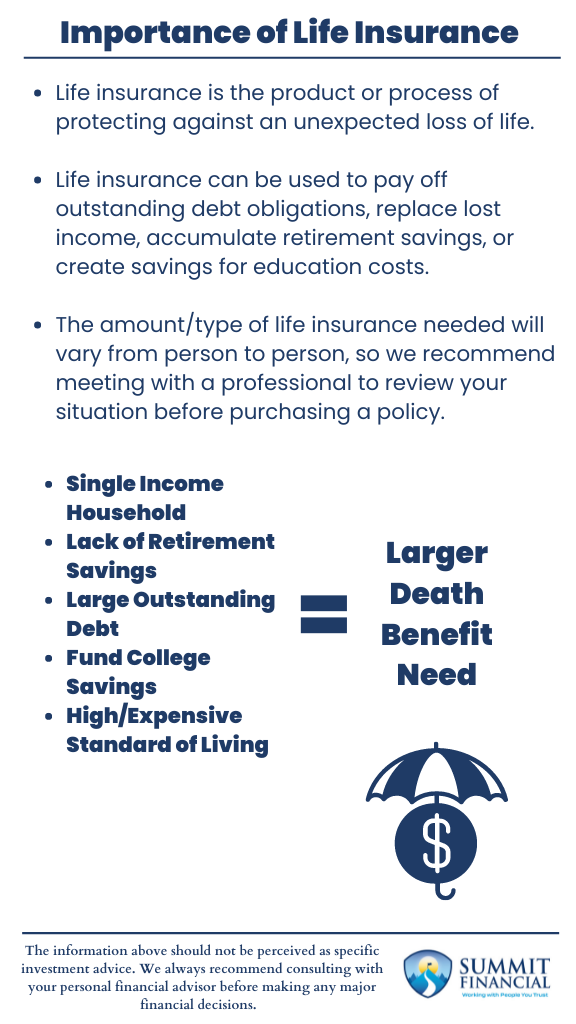Life insurance is a financial solution used to protect against the unexpected loss of life. Life is extremely valuable, both emotionally and financially. There are a lot of concerns that can arise when someone unexpectedly passes away, but life insurance can alleviate some of those issues.
By paying a lump sum or ongoing payments, you can purchase a policy with a death benefit payout if the insured passes away. The insured can be yourself, your spouse, your family member, or anyone you have a financial interest in.
Financial Reasons to Consider Life Insurance
There are plenty of reasons to purchase a life insurance policy, but financial reasons are certainly the main reason. Yes, the death benefit may help with emotional distress after death, but that is not the main reason to purchase a policy.
Many families will buy a policy to cover their outstanding debt, including the balance of their mortgage. Paying off debt with the policy benefits allows the beneficiaries to alleviate the financial burden of ongoing payments. Life insurance is commonly used to replace lost income, especially if the household is dependent on one source of income.
If the breadwinner passes away, the death benefit can be used to fulfill income needs so the surviving spouse does not always need to return to work. If income needs are not an issue, the death benefit can create savings for retirement or college education costs. A single-income household may struggle to set aside savings, but the death benefit can accomplish that goal.

Different Types of Life Insurance Policies
There are plenty of different policy structures that may be considered when purchasing life insurance. Term policies are temporary insurance that locks in the premium rate for the life of the policy. However, these typically only last a maximum of 30 years.
Whole Life policies are permanent policies which will last the entire lifetime of the insured. Sometimes these rates are locked in, but some times there are variable premium features which causes the payments to fluctuate. In addition, these permanent policies typically include a cash value feature which may generate savings within the policy. This cash value can be used in various ways and is typically dependent on the financial situation of the policy owner.
Lastly, final expense policies are typically smaller, fully funded plans that are meant for immediate expenses after death. These final expenses policies usually pay out benefits quicker than a traditional policy because they oftentimes do not require a death certificate that municipalities sometimes take weeks to create, so the beneficiaries can use the funds to pay for funeral or burial expenses. As always, we recommend meeting with a professional to review all of your life insurance options before purchasing a policy.
Negative Aspects of Life Insurance
However, there are some negative aspects of life insurance we feel the need to mention. First, the cost of the policy, especially larger policies, will be an extra monthly/annual bill for the household. A negative underwriting result may also increase the cost of the policy if the insurer expects the insured to be at a higher risk of passing during the life of the policy.
Lastly, there are times when a surrender period may come into play, and this could be a cost to the owner if they try to cancel or leave a permanent policy shortly after purchasing it.
Life Insurance- Summarized
- Life insurance is the product or process of protecting against an unexpected loss of life.
- Life insurance can be used to pay off outstanding debt obligations, replace lost income, accumulate retirement savings, or create savings for education costs.
- The amount/type of life insurance needed will vary from person to person, so we recommend meeting with a professional to review your situation before purchasing a policy.
Speak With a Trusted Advisor
If you have any questions about your investment portfolio, retirement planning, tax strategies, our 401(k) recommendation service, or other general questions, please give our office a call at (586) 226-2100. Please feel free to forward this commentary to a friend, family member, or co-worker. If you have had any changes to your income, job, family, health insurance, risk tolerance, or your overall financial situation, please give us a call so we can discuss it.
We hope you learned something today. If you have any feedback or suggestions, we would love to hear them.
Best Regards,
Zachary A. Bachner, CFP®
with contributions from Robert Wink, Kenneth Wink, James Wink, and James Baldwin
If you found this article helpful, consider reading:
Sources:
- https://www.investopedia.com/articles/active-trading/120814/life-insurance-smart-investment.asp
- https://www.investopedia.com/terms/t/termlife.asp


